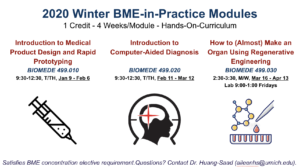2020 Winter BME-in-Practice Courses
Are you a freshman or sophomore interested in BME? Are you trying to understand what you can do with a BME degree? Are you ready to get started with your BME experience? Consider signing up for one or all of our 2020 Winter BME in Practice Courses. These 1-credit courses were created by your fellow students for you. Engage in hands on BME projects. These short 4-week modules will focus on one aspect of biomedical engineering and immerse you in the world of BME practice. Students can enroll in all 3 classes or just 1 to get a flavor of BME. Space will be limited (max 16 with waitlist).
BIOMEDE 499.010: Introduction to Medical Product Design and Rapid Prototyping
9:30-12:30, T/TH, Jan 9 – Feb 6
Want a leg up on future classes? Sick of exams and lectures? Want to get hired? Take Medical Product Design and Rapid Prototyping. This course takes students through all the steps of the design process as they redesign surgical equipment with their team. They will identify a need, define the problem, and generate their own concepts. After downselecting to one potential solution, students will learn how to use Fusion 360 and 3D printing to model and prototype their solution. Once they have created their device, they will learn about the iteration process and redesign their solutions. By the end of this course, students will have gained knowledge in the medical device industry, including how to design products that meet biomedical standards and good manufacturing practices (GMP). This class will prepare students to be competitive for the medical device industry and for future design courses.
BIOMEDE 499.020: Introduction to Computer-Aided Diagnosis
9:30-12:30, T/TH, Feb 11 – Mar 12
Software-enabled tools are becoming increasingly vital in the medical field for patient care. This is leading to an increased need for biomedical engineers with coding skills in addition to knowledge of engineering and biology. One key use for these tools is to enable faster and more accurate algorithmic diagnosis of pathologies and injuries using medical images.
In this course, students will work with instructors to develop an algorithm to automatically detect and objectively classify injuries or pathologies using medical images. Through lecture and a team-based final project, students will build upon the basic coding skills learned in ENGR 101 (Introduction to Computers and Programming). At the end of the course, each project team will then give a final presentation to share findings. Upon completion of this course, students will have additional coding skills to use in their undergraduate and postgraduate skills and a coding project that they can discuss in future interviews for a job or for graduate school.
The New York Times just recently published an article that shows how computer-aided diagnosis of medical images is being used in the real world to predict which patients may be likely to develop breast cancer. This course will help students to understand some of the fundamental skills needed to conduct ground-breaking research like this.
BIOMEDE 499.030: How to (Almost) Make an Organ using Regenerative Engineering
2:30-3:30, M/W, Mar 16 – Apr 13; Lab 9:00-1:00 Fridays
Harnessing and engineering biological processes have become an increasingly popular and successful strategy for therapeutic development. In 2018, nearly half of the FDA-approved therapeutics were contributed by small, but growing cellular biotechnology companies, many of which were translated from academic laboratories. As a result of taking this class, students will have an increased knowledge base for performing experiments in the cellular biotechnology field. In this 4-week, 1 credit course, Biomedical Engineering students will be exposed to this field by working in teams of 3-4 to design, execute, and statistically analyze an experiment exploring concepts related to tissue regeneration. During 4-hour labs, students will be introduced to skillsets sought-out by employers in biotechnology companies and academic research labs, including aseptic technique and a cell- or protein-based assay of their choosing. They will also learn the principles of experiment design and comparative statistics, and present their results in the form of an oral presentation. While projects will be very individualized and independent, each team will be supported and advised by GSIs and instructors with years of cell-culture experience.

